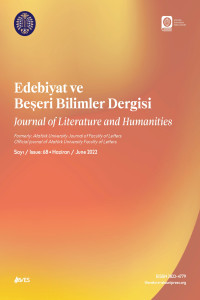ANTİK YUNAN’DA POLİS ÖNCESİ BİR SOSYO-EKONOMİK FORMASYON: OİKOS /A Socio-Economic Formation Before Police in Ancient Greek: Oikos
ÖzBu çalışmada; Karanlık çağlardan (MÖ. XI-VII) itibaren Antik Yunan toplumunun en temel birimi olan oikos’un önemi ve yapısı irdelenmektedir. Antik Yunan uygarlığında sosyal yaşamın mekânsal bir alanla sınırlı olduğu, insanların her türlü yaşamsal faaliyetlerinin vuku bulduğu birime oikos denmekteydi. Karanlık çağlardan itibaren ataerkil düşüncenin hâkim olduğu yaşamın bir yansıması olarak oikos, genellikle kurucu/erkek tarafından idare edilirdi. Hem üretim hem de tüketim merkezi olan oikos’ta, yaşam için gerekli olan bütün ürünler bulunur ve ortak biçimde üretilip tüketilirdi. Antik Yunan uygarlığının temel yapı taşı olan oikos, yaşamın şekillenmesinde sosyal bir zemin oluşturmuş ayrıca oikos’un bir çiftlik gibi yönetilmesi ve işlevsel bir yapıya sahip olması, ekonomi (oikonomia) olarak bilinen çağdaş bilim dalının da tarihsel temellerinin ortaya çıkışını sağlamıştır.Anahtar kelimeler: Antik Yunan, Oikos, Oikonomia, Polis (şehir-devleti), Kan Bağı.AbstractIn this study; The significance and structure of the oikos, the most basic unit of the ancient Greek society from the dark ages (XI-VII. BC) is examined. In ancient Greek civilization, is called oikos, the of social life was limited to a spatial area, and all kinds of life activities of people occurred. As a reflection of the life that patriarchal thought has dominated since the dark ages, oikos was generally ruled by the founder/man. In oıkos, the center of both production and consumption, all the products needed for life are found and consumed in common. Ancient Greek civilization oikos which is the basic building block of, have created a social floor in shaping the life also be managed as a farm oikos and having a functional structure, economy (oikonomi), known as led to the emergence of the historical foundations of modern science.Keywords: Ancient Greek, Oikos, Oikonomia, Police (city-states), Bloodline.
Anahtar Kelimeler:
Antik Yunan, Oikos, Oikonomia, Polis (şehir-devleti)
___
- Abbasoğlu Haluk. (1999). “Anadolu’da Antik Çağda Konut MÖ.1200-MS.700”, Tarihten Günümüze Anadolu’da Konut ve Yerleşme, İstanbul: Tarih Vakfı Yayınları.
- Aktüre, Sevgi. (2003). Anadolu’da Demir Çağı Kentleri, İstanbul: Türk Vakfı Yurt Yayınları.
- Ault, Bradley A. (2007). “Oikos and Oikonomia: Greek houses, households and the domestic economy”, British School at Athens Studies Puplished, Vol. 15, pp. 259-265, (Erişim Tarihi: 13.02.18.).
- Baloglou, Christor P. (2012). “The Tradition of Economic Thought in the Mediterranean World from the Ancient Classical Times Through the Hellenistic Times Until the Byzantine Times and Arab-Islamic World”, Handbook of the History of Economic Thought, London, Springer Press, pp. 7-93.
- Baykan, Daniş. (2007). “Andron ve Symposion Olgusunun Sosyo-Kültürel Nedenleri, Sosyal Yaşama Yansımaları ve İşleyişi”, Masrop E-Dergi, Sayı 1, İstanbul, ss. 1-5, (Erişim Tarihi: 15.02.18.).
- Blankenship, Debra. (1992). “Oikos and Polis in the Medea: Patterns of the Heart and Mind”, Portland State University, Volume 1, Nu. 3, Article 14, pp. 119-126, (Erişim Tarihi: 15.02.18.).
- Burton, Diana. (2003). “Public memorials, private virtues: women on classical Athenian grave monuments”, Victoria University of Wellington, New Zealand, Mortality, Vol. 8, No. 1. pp. 21-35, (Erişim Tarihi: 10.02.18.).
- Cameron, Gregory. (2008). “Oikos and Economy: The Greek Legacy in Economic Thought”, PhaenEx 3, No. 1, pp. 112-133, (Erişim Tarihi: 11.02.18.).
- Che, Jayoung. (2017). “Citizenship and the Social Position of Athenian Women in the Classical Age. A Prospect for Overcoming the Antithesis of Male and Female”, Athens Journal of History, Vol. 3, No. 2, pp. 97-118, (Erişim Tarihi: 10.02.18.).
- Cheizanoglou, Charalampos. (1991). “The House As Oikos İn A City As Polis”, Oxford, pp. 2-7, (Erişim Tarihi: 09.02.18.).
- Coulanges, Fustel De. (2011). Antik Site: Yunan’dan Roma’ya Kadar Tapınma, Hukuk ve Kurumlar Üzerine İnceleme, (Çev: İsmail Kılınç), Ankara: Epos Yayınları.
- Çelebi, Nilgün. (2007). “Socius, Oikos, Polis”, Ankara Ünv. DTCF, Sosyoloji Dergisi Ülgen Oskay’a Armağan Özel Sayısı, ss. 50-56, (Erişim Tarihi: 09.02.18.).
- Donlan, Walter. (1985). “The Socıal Groups Of Dark Age Greece”, pp. 293-308, The University Of Chicago. (Erişim Tarihi: 09.02.18.).
- Douglas, M. Macdowel. (1989). “The Oikos in Athenian Law”, Cambridge University Press, The Classical Quarterly, New Series, Vol. 39, No. 1. pp, 10-21, (Erişim Tarihi: 09.02.18.).
- Engels, Friedrich. (2003). Ailenin Özel Mülkiyetin ve Devletin Kökeni, (Çev: Kenan Somer), Sol Yayınları.
- Eren, Abdurrahman. (2005). “Özgürlükler Mekânı Olarak Kamusal Alan”, AÜEHFD, C, IX, Sayı, 3-4, ss. 96-124, (Erişim Tarihi: 13.02.18.).
- Ferrucci, Stefano. (2012). “Yunanistan’da Ekonomi”, Antik Yunan, İstanbul. Alfa Yayınları
- Yayın Aralığı: Yılda 2 Sayı
- Başlangıç: 1970
- Yayıncı: Atatürk Üniversitesi
Sayıdaki Diğer Makaleler
CENK HİKÂYELERİ: “ÖLMEYENLERDEN”
SANSÜRÜN ÇEVİRİDE İŞLEYİŞİ VE PATRONAJ/The Function of Censorship in Translation and Patronage
KERBELA-YI ALLAHÎ ÂRİF VE ŞİİRLERİ /Karbala-yı Allahi Arif and Poems
LUTFÎ’NİN GÜL Ü NEVRÛZ’U VE YAZMA NÜSHALARI/Lutfî’s Gul u Nevrûz and its Copies
Atatürk Üniversitesi Edebiyat Fakültesi Dergisi Yayın İlkeleri
